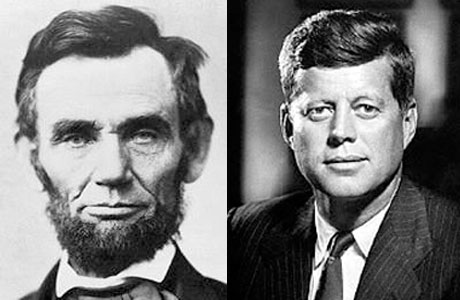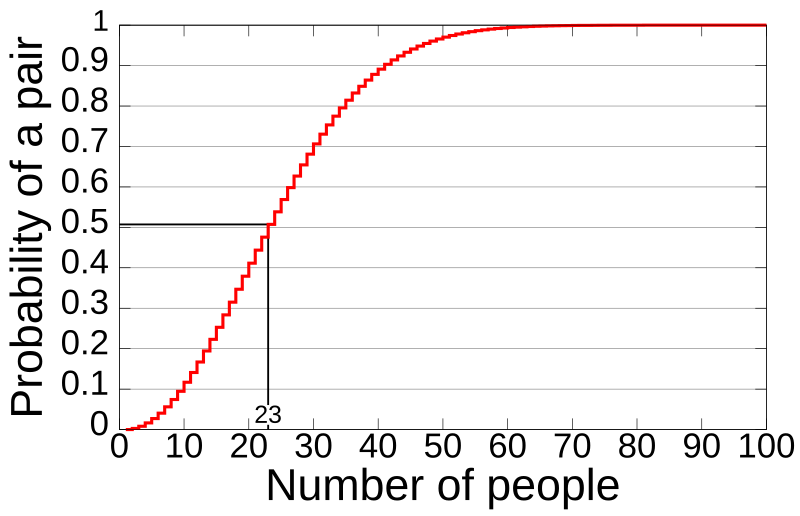
Have you heard about the odd similarities between John F. Kennedy and Abraham Lincoln? To name a few:
- Both were elected to the House of Representatives in '46
- Both were runners-up for their party's nomination in '56
- Both were elected to the presidency in '60
- Both were succeeded by Southern Democrats named Johnson (who were both born in '08)
- Lincoln had a secretary named Kennedy. Kennedy had a secretary named Evelyn Lincoln
- Lincoln was warned by his secretary to not go to the theatre. Kennedy was warned by his secretary not to go to Dallas
- Both were shot in the head, from behind, on a Friday, and in the presence of their wives
- Lincoln was shot in Ford's Theatre, Kennedy was shot in a Lincoln made by Ford
- Both John Wilkes Booth and Lee Harvey Oswald were born in '38
- Booth ran from a theatre to a warehouse, Oswald ran from a warehouse to a theatre
- Lincoln had two sons, Robert and Edward. Edward died young Robert lived on. Kennedy had two brothers named Robert and Edward. Robert died young and Edward lived on
Well...no. The truth is our minds are just very good at recognizing patterns. If information is missing our minds fill in the missing pieces. If two things are similar we can easily find more similarities. It's an important evolutionary trait. As early hunter/gatherers we needed to understand migration patterns of animals, we needed to recognize which berries made us sick, and we needed to predict the weather. We developed a pattern-seeking mind.
Of course, patterns don't always mean something and our pattern-seeking mind is ultra-sensitive. We see figures in the clouds, we think things like homeopathy are really helping us, and we are really bad at understanding coincidences.
As an example: How many people would you have to put in the same room until it is more than likely that two of them have the same birthday? Your pattern-seeking mind may want to say it would be about 180. If every birthday is equally likely, then birthday will be spread "randomly" throughout the year. It will become more likely than not to share a birthday once more than half of the days are taken. The truth may surprise you - choose 23 people and it is more than likely that 2 of them will share a birthday.

Even more surprising, choose 57 people and there is a 99% chance that 2 of them will share a birthday. Even armed with this knowledge you will still be surprised the next time you meet someone that shares your birthday. For exaple, did you know that in my high school I shared a birthday with 4 of my friends? Also, did you know that Sam, the only other contributor to this blog, has a birthday only one day away from mine?
It is for this reason that antectodal evidence is so dangerous. Our minds are so quick to make associations and doesn't really have a system in place to block false associations. We even make "close enough" associations, as in my birthday example above. If I allow a birthday being only one day off to count as "close enough" then the odds of sharing a birthday increase2.
So, no. There is no Lincoln/Kennedy conspiracy, it's not weird that we share a birthday, and evidence is very important.

Even more surprising, choose 57 people and there is a 99% chance that 2 of them will share a birthday. Even armed with this knowledge you will still be surprised the next time you meet someone that shares your birthday. For exaple, did you know that in my high school I shared a birthday with 4 of my friends? Also, did you know that Sam, the only other contributor to this blog, has a birthday only one day away from mine?
It is for this reason that antectodal evidence is so dangerous. Our minds are so quick to make associations and doesn't really have a system in place to block false associations. We even make "close enough" associations, as in my birthday example above. If I allow a birthday being only one day off to count as "close enough" then the odds of sharing a birthday increase2.
So, no. There is no Lincoln/Kennedy conspiracy, it's not weird that we share a birthday, and evidence is very important.
Notes
[1] Also...some of them are completely made up. However, if you were willing to believe them that just strengthens my argument.
[2] In a group of only 7 people it is more than likely that 2 of them will have a birthday within one week of each other. It is these "close enough" guesses that make psychics lots of money. When a grieving relative is willing to see a false association the odds of appearing psychic increase.
If you have a comment or a question, head over to my
